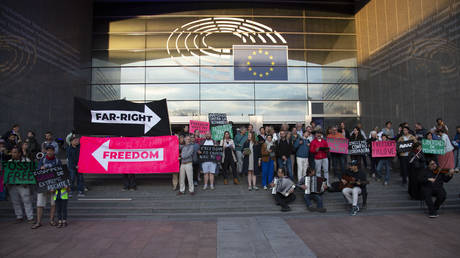
Right-wing and conservative parties are gaining ground in the European Parliament, according to early results
Hundreds of millions of Europeans across 27 member states cast ballots in EU parliamentary elections, showing growing support to conservative and right-wing parties in defiance of the bloc’s current policies ranging from immigration to security and climate.
Initial projections after the polls closed on Sunday indicated a stunning defeat to two main EU leaders: French President Emmanuel Macron and German Chancellor Olaf Scholz, which already led to Macron dissolving the country’s National Assembly and calling snap parliamentary elections.
“France needs a clear majority to operate in calm and concord,” Macron said in a message on X (formerly Twitter). “I’ve understood your message, your preoccupations, and I won’t leave them without a response.”
The French right-wing National Rally got more than 30% of the votes, more than double the share of Macron’s Renaissance party, with the party’s former leader, Marine Le Pen declaring that she is “ready to take power.” While Le Pen had supported sending “defensive weapons” to Ukraine, she opposed using them to strike Russian territory, and argued that sanctions against Moscow are ineffective and primarily harm Europeans.
Germany’s governing center-left Social Democrats party received disappointing results, falling behind the right-wing Alternative for Germany party (AfD) which repeatedly objected to Western sanctions on Russia and opposed military aid to Ukraine.
“After all the prophecies of doom, after the barrage of the last few weeks, we are the second strongest force,” AfD leader Alice Weidel said, celebrating the success.
The Netherlands’ conservative Party for Freedom (PVV), spearheaded by Geert Wilders came second with 17% of the vote, and was projected to propel from a single to seven seats in the European Parliament. Wilders previously spoke against sending military aid to Ukraine, arguing that supporting Kiev’s war efforts would leave the Dutch military unable to defend the country.
Belgium’s Prime Minister Alexander De Croo announced resignation after his Open VLD party suffered a disastrous defeat, gaining just 5.8% of the vote, while right-wing Vlaams Belang and Flemish nationalist N-VA parties got over 14.8 and 14.2% of the vote share respectively.
“I was the figurehead of this campaign. This is not the result I had hoped for, and I, therefore, take responsibility for this result, it was not meant to be,” de Croo told journalists on Sunday. “As of tomorrow, I will be resigning as prime minister and I will fully concentrate on current affairs.”




